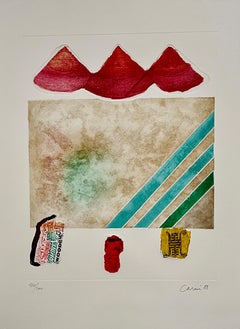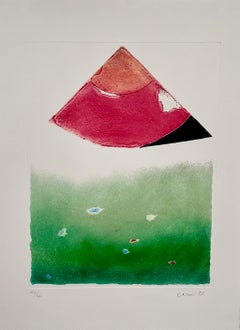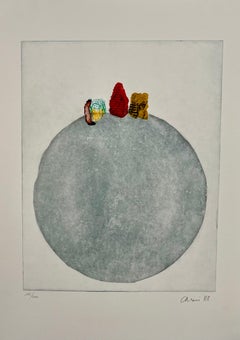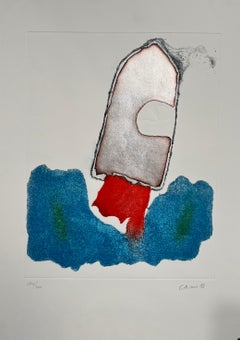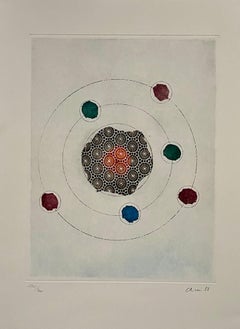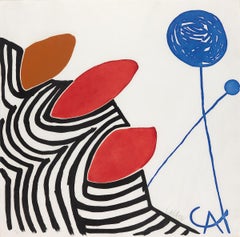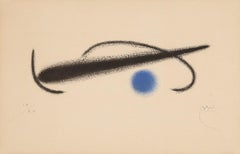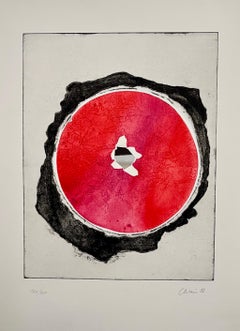Eugenio Carmi More Prints
Italian, 1920-1977
Eugenio Carmi was born in 1920 in Genoa, Italy. At age fifteen he began painting lessons, which came to a halt during the Second World War during which he graduated with a degree in chemistry from Swiss Federal Institute of Technology. In 1946, Carmi was living in Italy and became a student of the painter Felice Casorati, whose work remained an inspiration for his own in the next decade.
In the late 1950s, Carmi was tasked with promoting Cornigliano Steelworks and used steel and iron to create contemporary art to enhance the company’s image. This led to his first solo exhibition in 1958 at the Galleria Numero in Florence, where he presented enamel paintings on steel. During the 1960s and 1970s, Carmi focused on creating work inspired by the combination of industry and culture, leading to lithographs on tin plates and linking kinetic and audiovisual art. It was in the 1970s that he developed his signature geometric style, a contrast from the Art Informel style of the previous decades. He often used mathematical laws such as the Pythagoras theorem to create his precise geometric shapes, a nod to his training at the Swiss Federal Institute of Technology.to
5
Overall Width
to
Overall Height
to
12
678
450
224
179
5
5
5
5
5
5
Artist: Eugenio Carmi
Italian Abstract Aquatint Collage Lithograph Print Eugenio Carmi 80s Memphis Era
By Eugenio Carmi
Located in Surfside, FL
Genre: Modern, Modernist
Subject: Abstract
Medium: Print, Aquatint
Hand signed dated 1988, limited edition
Surface: Paper
Country: Italy
Dimensions: 26" x 20" approximately
Eugenio ...
Category
1980s Post-Modern Eugenio Carmi More Prints
Materials
Aquatint
Italian Abstract Aquatint Collage Lithograph Print Eugenio Carmi 80s Memphis Era
By Eugenio Carmi
Located in Surfside, FL
Genre: Modern, Modernist
Subject: Abstract
Medium: Print, Aquatint
Hand signed dated 1988, limited edition
Surface: Paper
Country: Italy
Dimensions: 26" x 20" approximately
Eugenio ...
Category
1980s Post-Modern Eugenio Carmi More Prints
Materials
Aquatint
Italian Abstract Aquatint Collage Lithograph Print Eugenio Carmi 80s Memphis Era
By Eugenio Carmi
Located in Surfside, FL
Genre: Modern, Modernist
Subject: Abstract
Medium: Print, Aquatint
Hand signed dated 1988, limited edition
Surface: Paper
Country: Italy
Dimensions: 26" x 20" approximately
Eugenio ...
Category
1980s Post-Modern Eugenio Carmi More Prints
Materials
Aquatint
Italian Abstract Aquatint Collage Lithograph Print Eugenio Carmi 80s Memphis Era
By Eugenio Carmi
Located in Surfside, FL
Genre: Modern, Modernist
Subject: Abstract
Medium: Print, Aquatint with metal foil
Hand signed dated 1988, limited edition
Surface: Paper
Country: Italy
Dimensions: 26" x 20" approxi...
Category
1980s Post-Modern Eugenio Carmi More Prints
Materials
Aquatint
Italian Abstract Aquatint Collage Lithograph Print Eugenio Carmi 80s Memphis Era
By Eugenio Carmi
Located in Surfside, FL
Genre: Modern, Modernist
Subject: Abstract
Medium: Print, Aquatint with metal foil
Hand signed dated 1988, limited edition
Surface: Paper
Country: Italy
Dimensions: 26" x 20" approxi...
Category
1980s Post-Modern Eugenio Carmi More Prints
Materials
Aquatint
Related Items
Presenza Grafica
By Alexander Calder
Located in New York, NY
Large, scarce limited edition color aquatint by Alexander Calder, from a limited edition of 90. Signed by Calder and numbered in pencil. Printed and published by 2RC Edizioni d'Art...
Category
1970s Abstract Eugenio Carmi More Prints
Materials
Aquatint
Abstract print by Joan Miró from "Fusées" portfolio, blue, black, beige
By Joan Miró
Located in Köln, DE
from "Fusées" - Joan Miró, one artwork out of "Fusées" portfolio
Wonderful exemplar form the portfolio "Fusées".
Aquatint etching from 1959
32 x 50 cm. Edition of 100
Category
1950s Abstract Eugenio Carmi More Prints
Materials
Aquatint
$8,488
H 12.6 in W 19.69 in
Oiseau Entre deux Astres
By Joan Miró
Located in New York, NY
A very good impression of this color aquatint, etching and carborundum. Signed and numbered 27/75 in pencil by Miro. Printed and published by Maeght, Paris.
Catalogue reference: Du...
Category
1960s Abstract Expressionist Eugenio Carmi More Prints
Materials
Color, Etching, Aquatint
The Razor's Edge
By Robert Motherwell
Located in New York, NY
A superb impression of this scarce color aquatint and lift-ground etching on German Etching paper. Signed and numbered 27/36 in pencil, lower right. Printed by Catherine Mousley in t...
Category
1980s Abstract Expressionist Eugenio Carmi More Prints
Materials
Color, Etching, Aquatint
Folsom Street Variation III (Primaries)
By Richard Diebenkorn
Located in New York, NY
Superb color work by American Abstract Expressionist master Richard Diebenkorn, from a limited edition of 60. Signed by Diebenkorn and numbered in pencil. Published by Crown Point ...
Category
Late 20th Century Abstract Expressionist Eugenio Carmi More Prints
Materials
Aquatint
Rare etching with aquatint on Hahnemühle paper, Signed/N Framed ex Deutsche bank
By Thomas Nozkowski
Located in New York, NY
Thomas Nozkowski
Untitled #5, 2008
Color etching with aquatint on Hahnemühle paper
Signed, dated and numbered 5/35 in graphite pencil on the back. Bears original Deutsche Bank collec...
Category
Early 2000s Abstract Eugenio Carmi More Prints
Materials
Etching, Aquatint
$3,500
H 14 in W 17 in D 1.25 in
Le Prophete Encercle
By Joan Miró
Located in New York, NY
Color aquatint and etching. Signed and numbered 10/75 in pencil, lower margin. Printed and published by Maeght, Paris.
Catalogue reference: Dupin 396.
Category
1960s Surrealist Eugenio Carmi More Prints
Materials
Etching, Aquatint, Color
"Homenaje a Picasso" - 20th Century Print by Eduardo Chillida, Abstraction
By Eduardo Chillida
Located in Köln, DE
This is one of the most important motifs in the graphic oeuvre of Chillida. The Spanish artist is very well known for his large-scale sculptures which can be found in public as well ...
Category
1970s Abstract Eugenio Carmi More Prints
Materials
Aquatint
$11,435
H 29.93 in W 22.45 in
Jean Miotte - Abstract Composition - Original Aquatint Engraving
By Jean Miotte
Located in Collonge Bellerive, Geneve, CH
Jean Miotte - Rare Original Aquatint Engraving
Title: Abstract Composition
Dimensions: 76 x 56 cm
Jean Miotte, 1926 - 2016
Miotte came of artistic age in the decade after World War...
Category
1970s Abstract Expressionist Eugenio Carmi More Prints
Materials
Aquatint
$1,414
H 29.93 in W 22.05 in D 0.04 in
Study for Sculpture in the Form of an Inverted Q Above & Below Ground Oldenburg
By Claes Oldenburg
Located in New York, NY
Study for Sculpture in the Form of an Inverted Q: Above and Below Ground, 1975
Lithograph, soft-ground etching, and aquatint in six colors on cream, thick, slightly textured Rive BFK paper
14 × 11 in. / 35.2 × 28 cm
Signed and dated in pencil, lower right, numbered in pencil, lower left. Edition of 100 with 20 AP. Printed by Bill Law, Winston Roeth and Allan Uglow at Petersburg Press...
Category
1970s Pop Art Eugenio Carmi More Prints
Materials
Etching, Aquatint, Lithograph
Study for Sculpture in the Form of an Inverted Q Above and Below Ground
By Claes Oldenburg
Located in New York, NY
This work is a study for Inverted Q, a large sculpture that Oldenburg created after producing many sketches and small models. At the time he was experimenting with concepts of monume...
Category
1970s Pop Art Eugenio Carmi More Prints
Materials
Etching, Aquatint, Lithograph
The Unknown Pair
By Mark Tobey
Located in New York, NY
A very good impression of this color aquatint on Richard de Bas cream wove paper. Signed and numbered 23/96 in pencil by Tobey. Published by Edition de Beauclair, Frankfurt am Main.
Category
1970s Abstract Expressionist Eugenio Carmi More Prints
Materials
Color, Aquatint
Previously Available Items
Italian Abstract Aquatint Collage Lithograph Print Eugenio Carmi 80s Memphis Era
By Eugenio Carmi
Located in Surfside, FL
Genre: Modern, Modernist
Subject: Abstract
Medium: Print, Aquatint
Hand signed dated 1988, limited edition
Surface: Paper
Country: Italy
Dimensions: 26" x 20" approximately
Eugenio ...
Category
1980s Post-Modern Eugenio Carmi More Prints
Materials
Aquatint
Eugenio Carmi more prints for sale on 1stDibs.
Find a wide variety of authentic Eugenio Carmi more prints available for sale on 1stDibs. You can also browse by medium to find art by Eugenio Carmi in etching and more. Much of the original work by this artist or collective was created during the 1980s and is mostly associated with the Surrealist style. Not every interior allows for large Eugenio Carmi more prints, so small editions measuring 19 inches across are available. Customers who are interested in this artist might also find the work of Mayo (Antoine Malliarakis), Marc Chagall, and Guntars Sietins. Eugenio Carmi more prints prices can differ depending upon medium, time period and other attributes. On 1stDibs, the price for these items starts at $507 and tops out at $507, while the average work can sell for $507.
